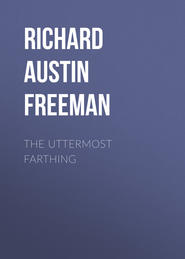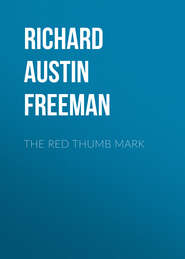По всем вопросам обращайтесь на: info@litportal.ru
(©) 2003-2024.
✖
The Eye of Osiris
Настройки чтения
Размер шрифта
Высота строк
Поля
"But," Jervis persisted, "what is she like, in appearance I mean. Short? fat? sandy? Give us intelligible details."
I made a rapid mental inventory, assisted by my recent cogitations.
"She is about five feet seven, slim but rather plump, very erect in carriage and graceful in movements; black hair, loosely parted in the middle and falling very prettily away from the forehead; pale, clear complexion, dark gray eyes, straight eyebrows, straight, well-shaped nose, short mouth, rather full; round chin—what the deuce are you grinning at, Jervis?" For my friend had suddenly unmasked his batteries and now threatened, like the Cheshire cat, to dissolve into a mere abstraction of amusement.
"If there is a copy of that will, Thorndyke," he said, "we shall get it. I think you agree with me, reverend senior?"
"I have already said," was the reply, "that I put my trust in Berkeley.
And now let us dismiss professional topics. This is our hostelry."
He pushed open an unpretentious glazed door, and we followed him into the restaurant, whereof the atmosphere was pervaded by an appetizing meatiness mingled with less agreeable suggestions of the destructive distillation of fat.
It was some two hours later when I wished my friends adieu under the golden-leaved plane trees of King's Bench Walk.
"I won't ask you to come in now," said Thorndyke, "as we have some consultations this afternoon. But come in and see us soon; don't wait for that copy of the will."
"No," said Jervis. "Drop in in the evening when your work is done; unless, of course, there is more attractive society elsewhere. Oh, you needn't turn that color, my dear child; we have all been young once; there is even a tradition that Thorndyke was young some time back in the pre-dynastic period."
"Don't take any notice of him, Berkeley," said Thorndyke. "The egg-shell is sticking to his head still. He'll know better when he is my age."
"Methuselah!" exclaimed Jervis. "I hope I shan't have to wait as long as that!"
Thorndyke smiled benevolently at his irrepressible junior, and, shaking my hand cordially, turned into the entry.
From the Temple I wended northward, to the adjacent College of Surgeons, where I spent a couple of profitable hours examining the "pickles" and refreshing my memory on the subjects of pathology and anatomy; marveling afresh (as every practical anatomist must marvel) at the incredibly perfect technique of the dissections, and inwardly paying tribute to the founder of the collection. At length the warning of the clock, combined with an increasing craving for tea, drove me forth and bore me toward the scene of my not very strenuous labors. My mind was still occupied with the contents of the cases and the great glass jars, so that I found myself at the corner of Fetter Lane without a very clear idea of how I had got there. But at that point I was aroused from my reflections rather abruptly by a raucous voice in my ear.
"'Orrible discovery at Sidcup!"
I turned wrathfully—for a London street-boy's yell, let off at point-blank range, is, in effect, like the smack of an open hand—but the inscription on the staring yellow poster that was held up for my inspection changed my anger to curiosity.
"Horrible discovery in a watercress-bed!"
Now, let prigs deny it if they will, but there is something very attractive in a "horrible discovery." It hints at tragedy, at mystery, at romance. It promises to bring into our gray and commonplace life that element of the dramatic which is the salt that our existence is savored withal. "In a watercress-bed," too! The rusticity of the background seemed to emphasize the horror of the discovery, whatever it might be.
I bought a copy of the paper, and, tucking it under my arm, hurried on to the surgery, promising myself a mental feast of watercress; but as I opened the door I found myself confronted by a corpulent woman of piebald and pimply aspect who saluted me with a deep groan. It was the lady from the coal shop in Fleur-de-Lys Court.
"Good evening, Mrs. Jablett," I said briskly; "not come about yourself, I hope."
"Yes, I have," she answered, rising and following me gloomily into the consulting-room; and then, when I had seated her in the patient's chair and myself at the writing table, she continued: "It's my inside, you know, doctor."
The statement lacked anatomical precision and merely excluded the domain of the skin specialist. I accordingly waited for enlightenment and speculated on the watercress-beds, while Mrs. Jablett regarded me expectantly with a dim and watery eye.
"Ah!" I said at length; "it's your—your inside, is it, Mrs. Jablett?"
"Yus. And my 'ead," she added, with a voluminous sigh that filled the apartment with odorous reminiscences of "unsweetened."
"Your head aches, does it?"
"Somethink chronic!" said Mrs. Jablett. "Feels as if it was a-opening and a-shutting, a-opening and a-shutting, and when I sit down I feel as if I should bust."
This picturesque description of her sensations—not wholly inconsistent with her figure—gave the clue to Mrs. Jablett's sufferings. Resisting a frivolous impulse to reassure her as to the elasticity of the human integument, I considered her case in exhaustive detail, coasting delicately round the subject of "unsweetened" and finally sent her away, revived in spirits and grasping a bottle of Mist. Sodae cum Bismutho from Barnard's big stock-jar. Then I went back to investigate the Horrible Discovery; but before I could open the paper, another patient arrived (Impetigo contagiosa, this time, affecting the "wide and arched-front sublime" of a juvenile Fetter Laner), and then yet another, and so on through the evening until at last I forgot the watercress-beds altogether. It was only when I had purified myself from the evening consultations with hot water and a nail-brush and was about to sit down to a frugal supper, that I remembered the newspaper and fetched it from the drawer of the consulting-room table, where it had been hastily thrust out of sight. I folded it into a convenient form, and, standing it upright against the water-jug, read the report at my ease as I supped.
There was plenty of it. Evidently the reporter had regarded it as a "scoop," and the editor had backed him up with ample space and hair-raising head-lines.
"HORRIBLE DISCOVERY IN A WATERCRESS-BED AT SIDCUP!"
"A startling discovery was made yesterday afternoon in the course of clearing out a watercress-bed near the erstwhile rural village of Sidcup in Kent; a discovery that will occasion many a disagreeable qualm to those persons who have been in the habit of regaling themselves with this refreshing esculent. But before proceeding to a description of the circumstances of the actual discovery or of the objects found—which, however, it may be stated at once, are nothing more or less than the fragments of a dismembered human body—it will be interesting to trace the remarkable chain of coincidences by virtue of which the discovery was made.
"The beds in question have been laid out in a small artificial lake fed by a tiny streamlet which forms one of the numerous tributaries of the River Cray. Its depth is greater than usual in the watercress-beds, otherwise the gruesome relics could never have been concealed beneath its surface, and the flow of water through it, though continuous is slow. The tributary streamlet meanders through a succession of pasture meadows, in one of which the beds themselves are situated, and here throughout most of the year the fleecy victims of the human carnivore carry on the industry of converting grass into mutton. Now it happened some years ago that the sheep frequenting these pastures became affected with the disease known as 'liver-rot'; and here we must make a short digression into the domain of pathology.
"'Liver-rot' is a disease of quite romantic antecedents. Its cause is a small, flat worm—the liver-fluke—which infests the liver and bile-ducts of the affected sheep.
"Now how does the worm get into the sheep's liver? That is where the romance comes in. Let us see.
"The cycle of transformation begins with the deposit of the eggs of the fluke in some shallow stream or ditch running through pasture lands. Now each egg has a sort of lid, which presently opens and lets out a minute, hairy creature who swims away in search of a particular kind of water-snail—the kind called by naturalists Limnoea truncatula. If he finds a snail, he bores his way into its flesh and soon begins to grow and wax fat. Then he brings forth a family—of tiny worms quite unlike himself, little creatures called rediae, which soon give birth to families of young rediae. So they go on for several generations, but at last there comes a generation of rediae which, instead of giving birth to fresh rediae, produce families of totally different offspring; big-headed, long-tailed creatures like miniature tadpoles, called by the learned cercariae. The cercariae soon wriggle their way out of the body of the snail, and then complications arise: for it is the habit of this particular snail to leave the water occasionally and take a stroll in the fields. Thus the cercariae, escaping from the snail find themselves on the grass whereupon they promptly drop their tails and stick themselves to the grass-blades. Then comes the unsuspecting sheep to take his frugal meal, and, cropping the grass swallows it, cercariae and all. But the latter, when they find themselves in the sheep's stomach, make their way straight to the bile-ducts, up which they travel to the liver. Here, in a few weeks, they grow up into full-blown flukes and begin the important business of producing eggs.
"Such is the pathological romance of the 'liver-rot'; and now what is its connection with this mysterious discovery? It is this. After the outbreak of 'liver-rot' above referred to, the ground landlord, a Mr. John Bellingham, instructed his solicitor to insert a clause in the lease of the beds directing that the latter should be periodically cleared and examined by an expert to make sure that they were free from the noxious water-snails. The last lease expired about two years ago, and since then the beds have been out of cultivation; but, for the safety of the adjacent pastures, it was considered necessary to make the customary periodical inspection, and it was in the course of cleaning the beds for this purpose that the present discovery was made.
"The operation began two days ago. A gang of three men proceeded systematically to grub up the plants and collect the multitudes of water-snails that they might be examined by the expert to see if any obnoxious species were present. They had cleared nearly half of the beds when, yesterday afternoon, one of the men working in the deepest part came upon some bones, the appearance of which excited his suspicion. Thereupon he called his mates, and they carefully picked away the plants piece-meal, a process that soon laid bare an unmistakable human hand lying on the mud amongst the roots. Fortunately they had the wisdom not to disturb the remains, but at once sent off a message to the police. Very soon, an inspector and a sergeant, accompanied by the divisional surgeon, arrived on the scene, and were able to view the remains lying as they had been found. And now another very strange fact came to light; for it was seen that the hand—a left one—lying on the mud was minus its third finger. This is regarded by the police as a very important fact as bearing on the question of identification, seeing that the number of persons having the third finger of the left hand missing must be quite small. After a thorough examination on the spot, the bones were carefully collected and conveyed to the mortuary, where they now lie awaiting further inquiries.
"The divisional surgeon, Dr. Brandon, in an interview with our representative, made the following statements:
"'The bones are those of the left arm of a middle-aged or elderly man about five feet eight inches in height. All the bones of the arm are present, including the scapula, or shoulder-blade, and the clavicle, or collar-bone, but the three bones of the third finger are missing.'
"'Is this a deformity or has the finger been cut off?' our correspondent asked.
"'The finger has been amputated,' was the reply. 'If it had been absent from birth, the corresponding hand bone, or metacarpal, would have been wanting or deformed, whereas it is present and quite normal.'
"'How long have the bones been in the water?' was the next question.
"'More than a year, I should say. They are quite clean; there is not a vestige of the soft structures left.'
"Have you any theory as to how the arm came to be deposited where it was found?'
"'I should rather not answer that question,' was the guarded response.
"'One more question,' our correspondent urged. 'The ground landlord, Mr. John Bellingham; is he not the gentleman who disappeared so mysteriously some time ago?'
"'So I understand,' Dr. Brandon replied.
"'Can you tell me if Mr. Bellingham had lost the third finger of his left hand?'
"'I cannot say,' said Dr. Brandon; and he added with a smile, 'you had better ask the police.'
"That is how the matter stands at present. But we understand that the police are making active inquiries for any missing man who has lost the third finger of his left hand, and if any of our readers know of such a person, they are earnestly requested to communicate at once, either with us or the authorities.
"Also we believe that a systematic search is to be made for further remains."
Другие электронные книги автора Richard Austin Freeman
The Vanishing Man




 4.67
4.67









